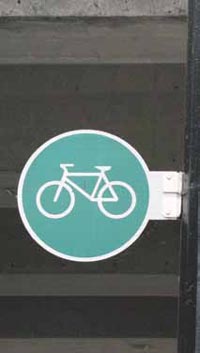 Good green policies like bike-ways, pedestrian friendly streets, increased transit, decreased freeways and car use, composting and recycling, urban food production, stream rehabilitation and green space protection can make all our lives better.
Good green policies like bike-ways, pedestrian friendly streets, increased transit, decreased freeways and car use, composting and recycling, urban food production, stream rehabilitation and green space protection can make all our lives better.
by Joe Foy
Mirror mirror on the wall – who is the greenest of them all? My own face stared back at me, half covered in shaving cream. I had just read an on-line opinion article with my morning coffee entitled “Greenest city moniker an Orwellian nightmare” written by Harvey Enchin, and published in the Vancouver Sun.
Mr. Enchin had started his article with the statement that “… Green economies don’t create wealth, but dissipate it, which should send a shudder down the spine of every person in Vancouver” What on Earth had sparked Mr. Enchin’s ire, I wondered?
Vancouver had just been chosen as the greenest city in Canada by Siemens, a German engineering mega-corporation with offices around the planet. And, Mayor Gregor Robertson had been talking up his plan for Vancouver to be chosen as the greenest city in the world in the not too distant future.
As a consequence Mr. Enchin had written his article to sound the alarm of impending doom. For Mr. Enchin, Vancouver is becoming too green.
Later on I read an article in the Globe & Mail by Mark Hume poking a bit of fun at the greenest city moniker by pointing out the massive “ghastly blue haze” of smog that rises from Vancouver daily, then is swept from the city’s skies and deposited on Fraser Valley communities by the winds coming in from the Pacific. Does Vancouver owe its high green rating to a lucky breeze – and can a city be called green with such a dark cloud hanging over its neighbours? In Mr. Hume’s eyes Vancouver didn’t seem very green at all.
Now, I have to admit that I lean more to Mr. Hume’s point of view: Vancouver’s still got a ways to go in improving air quality, public transportation and waste reduction, to name a few green issues.
But Vancouver has some notable, green policies in place and – contrary to what Mr. Enchin thinks – I believe some of those green initiatives are good policies.
What’s a good green policy? I think that good green policy should be, well, good – like good food. It should be a good value and affordable. It should taste good and be good for you, your community and your planet’s health too.
Take Vancouver’s push to expand bike routes throughout the city. On their own, Vancouver’s bike-ways aren’t going to save the world, but they have made a huge positive difference in my life and the lives of thousands of people in the Metro Vancouver area. I started biking the 20km from my home in New Westminster to my work place in Gastown 20 years ago – before there were any official bike routes. I think my chances of being run over and injured or killed would have been a lot higher, were it not for the increased safety that the new bike-ways have provided. Thanks to each additional person that chooses to bike to work or school – and I see more and more every day – we can all breathe a little easier. Bike transportation networks save money, conserve land, water and air, don’t damage the climate and are good for public health. That’s good green policy.
On the other hand there is currently a proposal to build garbage burning facilities throughout Metro Vancouver and perhaps Vancouver Island too – to convert household waste into electrical energy. Proponents say that this will cut down on landfill loads – but I am thinking that turning the sky – and our lungs – into a landfill is not good green policy at all. Increased composting, recycling and strict laws restricting retail packaging materials and food containers are all better alternatives calculated to save time, money, and our health.
Just because someone says a policy is good and green doesn’t necessarily make it so. Pumping toxins into the air or ruining the last wild rivers or oldgrowth forests should never be considered good green policies – even though some have claimed these activities to be green at one time or another.
But – in today’s world, good green policy, like bike-ways, pedestrian friendly streets, increased transit, decreased freeways and car use, composting and recycling, urban food production, stream rehabilitation and green space protection can make all our lives better. And, in tomorrow’s world, good green policy will make our lives – and our children’s lives – worth living.
***
Joe Foy is Campaign Director for the Wilderness Committee, Canada’s largest citizen-funded membership-based wilderness preservation organization.
[From WS November/December 2011]